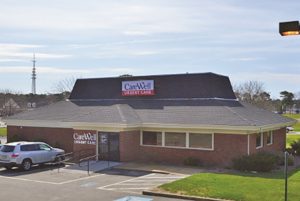PROVINCETOWN — Health care is rarely simple. The question of who can access it, where, when, and for how much often gets a conditional and specific answer that’s different for each particular constellation of symptoms, insurer, and office. The Covid-19 pandemic hasn’t changed the system — it’s just made it more visible.
The primary question for getting Covid tests is the famous one from Chicago politics: who sent you? If you have symptoms, or if a contact tracer told you that you were in close proximity to an infected person for a prolonged period of time — then, a test is considered medically necessary. The office visit, sample collection, and laboratory work may all be billed separately, but insurance should cover nearly all of it.
For the uninsured, undocumented, or people from out of state, however, things can quickly get complicated. Health Safety Net is a state program that can cover some of these situations, according to Gerry Desautels of Outer Cape Health Services, but an out-of-pocket bill is still possible. State money could pay for the test itself, for instance, but not for the office visit where the sample is collected — or vice versa.
A lot of energy and money is going into making sure that people who are contact-traced get tested. Local health departments may have money for a test if the state or insurance companies aren’t helping. In general, people who have symptoms or have been contact-traced can find financial support for getting tested.
Testing Without Symptoms
What makes this coronavirus so dangerous, of course, is that it can be spread by people who never feel symptoms and don’t know they’re infected. Testing those people is part of the solution, too, but the questions of how and who pays still exist.

Insurance generally doesn’t cover testing in symptomless people who have not been contact-traced. CareWell Urgent Care, a network of 17 private clinics in Massachusetts and Rhode Island, offers a lab-based Covid test for $160 for asymptomatic people. Its South Dennis clinic is the closest place to the Outer Cape that offers testing to people on these terms.
Some of the people who come to CareWell for a Covid test want to know if they can safely see their elderly parents or extended family, according to Sarah McLain, a senior market leader at CareWell. Others want to send their kids to camp or clear themselves for travel.
“These are diagnostic tests — they weren’t really designed for some of these social decisions,” said McLain. “There is a chance of a false negative, and we explain that. But we’re going to use the tools we have for the situations we face.”
Expanded Screening
Some jurisdictions have begun systematically screening workers in high-contact industries. Rhode Island has an asymptomatic testing program that includes bus drivers, child-care workers, first responders, and restaurant workers. Nantucket’s health dept. specifically invites groups of essential workers to get screening tests, and on Martha’s Vineyard anyone who believes they may have been exposed can get a free test.
Provincetown is working on a testing program for workers who are heavily exposed to the public, said Health Director Morgan Clark and board of health chair Steve Katsurinis. Employers would pay half the $150 cost of each test, and the town would pay the other half.
Even picking up half the cost can add up. Provincetown is hoping to see 200 frontline workers tested next week, according to Katsurinis. At $75 per test, the town could spend up to $15,000. The timing of the program, two to three weeks after July 4th weekend, is meant to find out whether the crowds that were here ended up spreading the virus. Provincetown hasn’t reported any infections in almost six weeks, and the health dept. is hoping to find new cases early.
The Cape’s state legislators are working to bring a mobile testing program to Barnstable County. State senators Julian Cyr and Susan Moran added $250,000 for this purpose to a bill that passed the senate but still has to be reconciled with one from the state house of representatives.
Delayed Results
Large-scale testing is limited by more than just available funds, however. According to Dr. John Cornwell, regional medical director for CareWell, “Dramatically expanding the testing would be ideal … but it’s overwhelming the work force and the equipment available,” especially in the labs.
Early in the crisis, when all tests were processed by the Centers for Disease Control lab, results took about 7 to 10 days, said Cornwell. “When the private sector got their labs going, turnaround time was down to around four days,” he said. “Now that capacity is overextended, and results take about eight days.”
Waiting eight days for a Covid test result can be a real hardship, especially for people who have symptoms or were identified by a contact tracer — they often have to self-isolate until results come back. Three days is a relatively small disruption; eight days is an entire week of income.
There is a rapid test that gives results in 15 minutes: it costs about the same, but its false negative rate is more than double that of the lab test, according to Cornwell. False negatives are the bête noire of screening — they give people an implicit sense that they can safely mingle, and thus contribute to the very spread of virus that screening was meant to stop. This is why lab tests remain the standard for now.



